八上unit6公开课 SectionA(1a-1c)
- 格式:ppt
- 大小:10.46 MB
- 文档页数:21
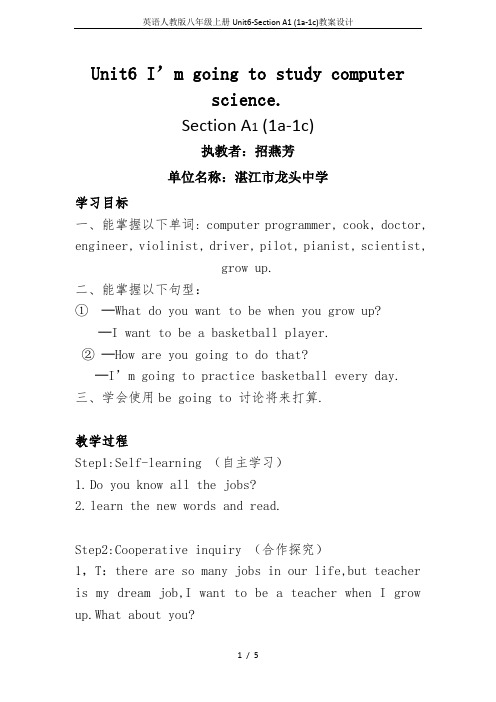
Unit6 I’m going to study computerscience.Section A1 (1a-1c)执教者:招燕芳单位名称:湛江市龙头中学学习目标一、能掌握以下单词: computer programmer, cook, doctor, engineer, violinist, driver, pilot, pianist, scientist,grow up.二、能掌握以下句型:①─What do you want to be when you grow up?─I want to be a basketball player.②─How are you going to do that?─I’m going to practice basketball every day. 三、学会使用be going to 讨论将来打算.教学过程Step1:Self-learning (自主学习)1.Do you know all the jobs?2.learn the new words and read.Step2:Cooperative inquiry (合作探究)1,T:there are so many jobs in our life,but teacher is my dream job,I want to be a teacher when I grow up.What about you?A:─What do you want to be when you grow up?B: ─I want to be a basketball player,a computer programmer...A:─How are you going to do that?─I’m going to practice basketball every day,study computer science...2,Pair workA:─I want to be a basketball player,a computer programmer...B:─How are you going to do that?A:─I’m going to practice basketball every day.study computer science...3,listening (1b)Step3: elaboration and analysis(精讲释疑)知识点 1 【重,难点】 What do you want to be when you grow up?当你长大以后,你想要成为什么?考向一 want to be 意为“想成为...”如:我想成为一名厨师。

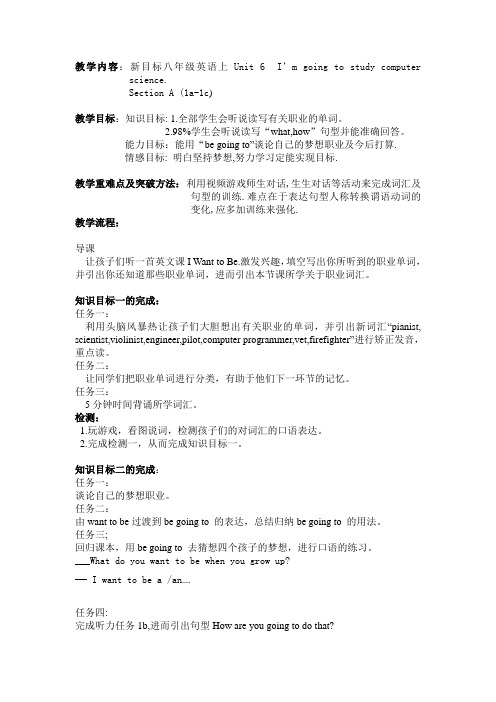
教学内容:新目标八年级英语上Unit 6 I’m going to study computer science.Section A (1a-1c)教学目标:知识目标: 1.全部学生会听说读写有关职业的单词。
2.98%学生会听说读写“what,how”句型并能准确回答。
能力目标:能用“be going to”谈论自己的梦想职业及今后打算.情感目标: 明白坚持梦想,努力学习定能实现目标.教学重难点及突破方法:利用视频游戏师生对话,生生对话等活动来完成词汇及句型的训练.难点在于表达句型人称转换谓语动词的变化,应多加训练来强化.教学流程:导课让孩子们听一首英文课I Want to Be.激发兴趣,填空写出你所听到的职业单词,并引出你还知道那些职业单词,进而引出本节课所学关于职业词汇。
知识目标一的完成:任务一:利用头脑风暴热让孩子们大胆想出有关职业的单词,并引出新词汇“pianist, scientist,violinist,engineer,pilot,computer programmer,vet,firefighter”进行矫正发音,重点读。
任务二:让同学们把职业单词进行分类,有助于他们下一环节的记忆。
任务三:5分钟时间背诵所学词汇。
检测:1.玩游戏,看图说词,检测孩子们的对词汇的口语表达。
2.完成检测一,从而完成知识目标一。
知识目标二的完成:任务一:谈论自己的梦想职业。
任务二:由want to be过渡到be going to 的表达,总结归纳be going to 的用法。
任务三;回归课本,用be going to 去猜想四个孩子的梦想,进行口语的练习。
___What do you want to be when you grow up?—— I want to be a /an….任务四:完成听力任务1b,进而引出句型How are you going to do that?任务五:同学之间进行编写对话的训练。
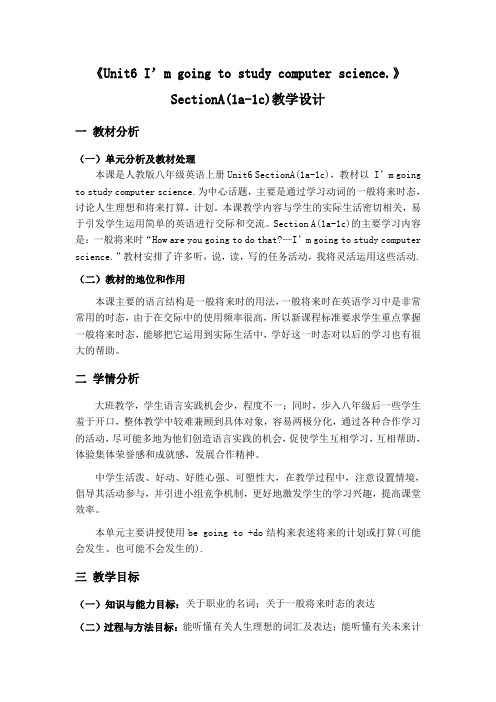
《Unit6 I’m going to study computer science.》SectionA(1a-1c)教学设计一教材分析(一)单元分析及教材处理本课是人教版八年级英语上册Unit6 SectionA(1a-1c),教材以 I’m going to study computer science.为中心话题,主要是通过学习动词的一般将来时态,讨论人生理想和将来打算,计划。
本课教学内容与学生的实际生活密切相关,易于引发学生运用简单的英语进行交际和交流。
Section A(1a-1c)的主要学习内容是:一般将来时“How are you going to do that?—I’m going to study computer science.”教材安排了许多听,说,读,写的任务活动,我将灵活运用这些活动.(二)教材的地位和作用本课主要的语言结构是一般将来时的用法,一般将来时在英语学习中是非常常用的时态,由于在交际中的使用频率很高,所以新课程标准要求学生重点掌握一般将来时态,能够把它运用到实际生活中,学好这一时态对以后的学习也有很大的帮助。
二学情分析大班教学,学生语言实践机会少,程度不一;同时,步入八年级后一些学生羞于开口,整体教学中较难兼顾到具体对象,容易两极分化,通过各种合作学习的活动,尽可能多地为他们创造语言实践的机会,促使学生互相学习,互相帮助,体验集体荣誉感和成就感,发展合作精神。
中学生活泼、好动、好胜心强、可塑性大,在教学过程中,注意设置情境,倡导其活动参与,并引进小组竞争机制,更好地激发学生的学习兴趣,提高课堂效率。
本单元主要讲授使用be going to +do结构来表述将来的计划或打算(可能会发生、也可能不会发生的).三教学目标(一)知识与能力目标:关于职业的名词;关于一般将来时态的表达(二)过程与方法目标:能听懂有关人生理想的词汇及表达;能听懂有关未来计划的表达;能进行有关人生的谈话;能进行有关将来计划的讨论。
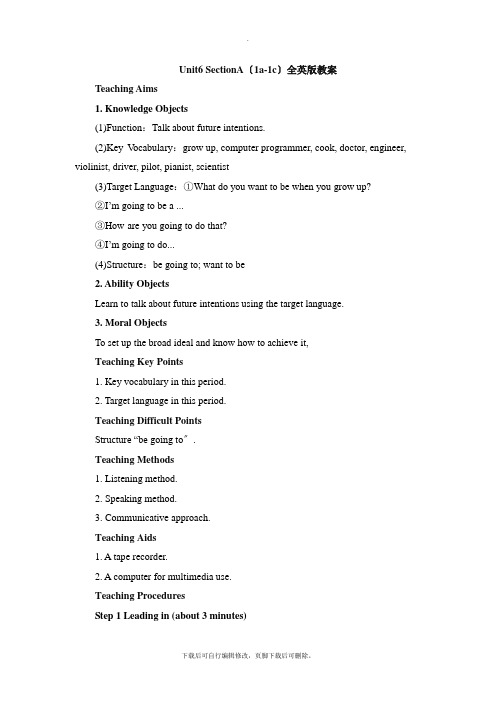
Unit6 SectionA〔1a-1c〕全英版教案Teaching Aims1. Knowledge Objects(1)Function:Talk about future intentions.(2)Key V ocabulary:grow up, computer programmer, cook, doctor, engineer, violinist, driver, pilot, pianist, scientist(3)Target Language:①What do you want to be when you grow up?②I’m going to be a ...③How are you going to do that?④I’m going to do...(4)Structure:be going to; want to be2. Ability ObjectsLearn to talk about future intentions using the target language.3. Moral ObjectsTo set up the broad ideal and know how to achieve it,Teaching Key Points1. Key vocabulary in this period.2. Target language in this period.Teaching Difficult PointsStructure “be going to〞.Teaching Methods1. Listening method.2. Speaking method.3. Communicative approach.Teaching Aids1. A tape recorder.2. A computer for multimedia use.Teaching ProceduresStep 1 Leading in (about 3 minutes)T:Hello, boys and girls. Nice to meet you again. Would you like to tell me your parents’jobs? You can say like this:My mother is a ... My father is a…S1:My father is a doctor. My mother is a teacher.S2:My father is a policeman. My mother is a nurse.T:Good. Please write their jobs on the blackboard. Draw a chart with two columns on the blackboard, with “father〞and “mother as t he headings. And let students write their parents, jobs on the blackboard.Object:In this way, help students to review the words they have learned about jobs before, such as doctor, teacher, policeman, waiter, driver and so on.Step 2 la (about 10 minutes)Show some word cards to students and help them to learn about some new jobs.T:Now please look at these cards. Do you know what jobs they are?First get students to identify the jobs by themselves, then read each word and explain both in English and Chinese. Students repeat after the teacher.T:Computer programmer is a person whose job is to write programs for a computer.(introducing computer games)Pilot — a person who flies a plane.Basketball player— a person who plays basketball (introducing baseball player, volleyball player ...)Engineer —someone whose job is to design or build roads, bridges, machines,and so on.Actor — a man who plays a role in a play or a film or television programs, (introducing actress.)Ask some students to read each new word to the class, correct their pronunciations.T:Do you think these jobs are interesting? (Students may have all kinds of responses.) Now rank them please. 1 is the most interesting and 12 is the least interesting.Check their answers and find out the most in teresting job in the students’opinions.Step 3 Function presentation (about 10 minutes)T:(Ask one of the students) Would you like to be a computer programmer in the future?S1:Yes. I like to be a computer programmer.T:That is to say,“ You are going to b e a computer programmer in the future.〞(Writing the sentence on the blackboard)Circle “are going to〞on the blackboard.T:Today we’ll learn to talk about future intentions using “ be going to 〞. Future intention means something you want to do or plan to do in the future.T:We learned to talk about future plans using “be + v. –ing〞structure. Remember? Could you give me an example?S1:I’m buying a new bike. (Write on the blackboard and ci rcle the “-ing〞word)S2:—Where are you going next week?—I’m going to my grandmother’s home next week.T:Very good. We can use “be + v. –ing〞to talk about future events. Today we’ll talk about future intentions using “be going to〞structure. Look at this sentence:I’m g oing to be a computer programmer when I grow up. (Writing the sentence on the blackboard)Circle “when I grow up〞and point out that it is not a question but means time.T:Please read after me.Students repeat the sentence after the teacher. Then let them practice making more sentences with the words in activity la, using the structure: I am going to be a....Step 4 1b (about 10 minutes)Call attention to the items in activity lb. Let students read the items before listening to the tape. Then tell them what they are supposed to do.T:Look at the example give n. “ Computer programmer〞is connected with“study computer science〞. That is to say, if you are going to be a computer programmer, you should/ need to study computer science.Then play the recording. Students do the match work.Play the recording again and students check their answers.After listening, ask students to practice reading the phrases in activity 1b and explain what a professional basketball player is like.Step 5 1c (about 10 minutes)First, get students to practice the conversation in1c on page 41 in pairs.Call attention to the two questions:1. What are you going to be when you grow up?2. How are you going to do that?T:What—question asks about the jobs and how—question asks about the actions you will take. Is that clear? Now look at the conversation in the picture. Let’s read it. Boys play role A. Girls play role B.…Then let them work in pairs and make more conversations about the other jobs.Get several pairs to demonstrate their conversations to the class.Step 6 Summary and Homework (about 2 minutes)T:Now let’s come back to the key words and sentences we have learned today.Pointing to the blackboard. Let boys read the key words first and ask girls if there are some mistakes, and then let girls ask and boys answer using the sentences on the blackboard.Call attention to the word order, pointing out we should say “how are you〞not “how you are〞.Homework:Have a conversation about your future job with your partner and write down your conversation on your exercise book. Please use “what〞and “how〞questions.Black board DesignUnit 6 I’m going to study computer science.The First Period (Section A la—1c)Key V ocabulary:grow up, computer programmer, cook, doctor, engineer, violinist, driver, pilot, pianist, scientistKey Sentences:1. What do you want to .be when you grow up?2. I’m going to be a basketball player.(…an engineer, actor, computer programmer.)3. How are you going to do that?4. I’m going to practice basketball every day.(…study math really hard.)(…study computer science.)(...take acting lessons.)。
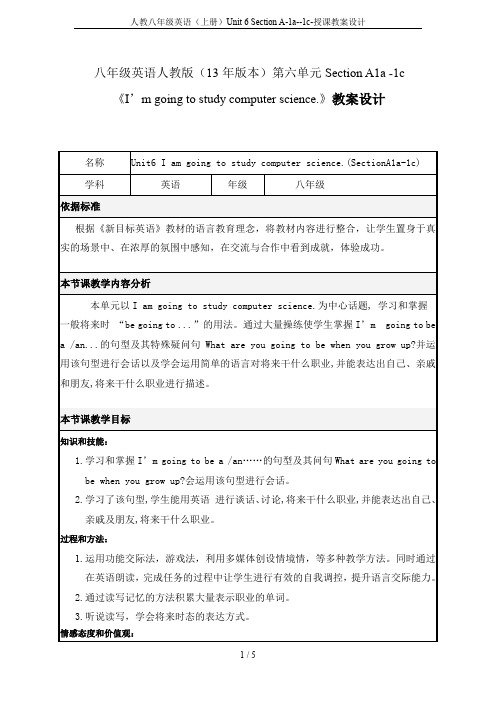
英语人教版八年级上册Unit6SectionA(1a-1c)课程教学设计Unit6 I’m going to study computer science.Section A(1a-1c)教学设计一、教学目标:(一)知识与技能1、能掌握本节课所学习的单词如:computer programmer、engineer、bus driver、basketball player、pilot、scientist、violinist、pianist、actor、actress及短语grow up和be going to.2、能熟练运用句型:A : What do you want to be when you grow up?B : I want to be a/an……A : How are you going to do that?B : I’m going to……及用第三人称单数形式来进行问答。
(二)过程与方法1、通过听说练习,能学会关于职业的单词和短语。
2、通过游戏活动和大量的对话练习,能谈论未来工作的打算。
(三)情感态度和价值观通过描述职业,表达自己的看法,使学生在人际交往中学会尊重别人,能交换不同的看法,增进情谊。
同时让学生们知道要想实现梦想职业必须通过自己的努力,遇到困难不要放弃。
二、教学重点、难点重点:be going to表示一般将来时难点:一般将来时be going to中的be的具体形式和后面接动词原形的用法,而学生根据自己喜欢的职业,运用所学知识谈论自己打算怎么做才能实现目标既是难点,又是能力训练点。
三、教材分析本节课是第六单元第一课时,主要学习的内容就是如何用英语谈论职业及打算。
以及重点句型”want to be”、“be going to”。
本节课要求讲到2C部分,但是考虑到我们农村学生的实际情况,这节课我只设计到1C,把下一节课需要掌握的第三人称单数变化提前设计到这节课中,让学生的能力得到提升。